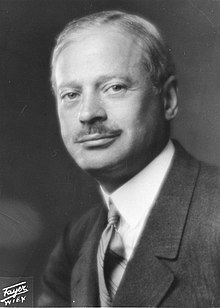
Summary
Louis Nathaniel, Baron von Schwartz de Rothschild (German: Ludwig Nathaniel, Freiherr von Rothschild[1]) was an Austrian Baron from the famous Rothschild family.
Louis Nathaniel de Rothschild | |
|---|---|
 Louis Nathaniel de Rothschild (1882–1955), the last great exponent of the Viennese branch of the Rothschild family. | |
| Born | Ludwig Nathaniel Freiherr von Rothschild 5 March 1882 |
| Died | 15 January 1955 (aged 72) |
| Nationality | Austrian |
| Occupation | Banker |
| Spouse | |
| Parent(s) | Albert Salomon von Rothschild and Bettina Caroline de Rothschild |
He was born in Vienna on 5 March 1882 and died of heart failure while swimming in Montego Bay, Jamaica on 15 January 1955.[2]
Early life edit
He was the son of Baron Albert Salomon Anselm von Rothschild and his wife, Bettina Caroline de Rothschild (1858–1892). He owned numerous spectacular palaces in Vienna, the Palais Rothschild, that housed exquisite art collections and antiques.
Banker edit
After the death of his father, Albert Rothschild, in 1911, he took over the management of the Creditanstalt bank and industrial companies owned by the Austrian branch of the Rothschilds.[3][4]
Held for ransom by Nazis edit
After the Anschluß of Austria to Nazi Germany in March 1938, he was arrested at the airport at Aspern[5] and held by the Nazis.[6] He was released only after lengthy negotiations between the family and the Nazis and upon payment of $21,000,000, believed to have been the largest bail bond in history for any individual.[7]
While imprisoned he was visited by Heinrich Himmler. Rothschild apparently impressed the SS leader, who subsequently ordered that Rothschild's prison conditions be improved with better furniture and sanitation facilities.[8] Despite appeals from Queen Mary of the United Kingdom and possibly the Duke of Windsor, Rothschild was held in Vienna's Hotel Metropole while the German government attempted to expropriate his business concerns.[9] He was imprisoned at least through July 1938, and his property placed under control of a German "commissioner".[10] Felix Somary, in his memoirs,[11] recalls that, soon before the Anschluss, he phoned to the baron repeatedly, in a desperate attempt to convince him to leave Austria. The day before the Anschluss, Louis's brother Alphons and his wife were visiting him in Switzerland, wanting to go back into Austria; he persuaded them to remain there, and to get his children Francesca de Rothschild and Heidi de Rothschild away from Austria to the Netherlands.
Finally allowed to leave Austria, Louis survived the Holocaust and Second World War.
Aryanisations and seizures edit
All of the Rothschild possessions were plundered and subsequently "Aryanised".[12] The city-palace of the family was destroyed after the war. The baron never received most of his former belongings back, since most of the paintings were taken over by the Austrian state, which did not allow the paintings to leave the country. In 1998, over 200 art works were returned to the Rothschild heirs by the Austrian Government, and were placed at Christie's in London for auction in 1999.[13]
Personal life edit
In 1946 he married the Countess Hildegarde Karoline Johanna Maria von Auersperg (1895–1981), the only daughter of Count Anton von Auersperg (1858-1924) and his wife, Valerie Schenk von Lédecz (1875-1931). They lived in East Barnard, Vermont (United States) and England. He died childless in 1955.
Postwar edit
In 2020, in one of the largest ever restitution claims filed, Rothschild heirs sued Vienna over a trust seized by Nazis.[14]
See also edit
Notes edit
- ^ Regarding personal names: Freiherr was a title before 1919, but now is regarded as part of the surname. It is translated as Baron. Before the August 1919 abolition of nobility as a legal class, titles preceded the full name when given (Graf Helmuth James von Moltke). Since 1919, these titles, along with any nobiliary prefix (von, zu, etc.), can be used, but are regarded as a dependent part of the surname, and thus come after any given names (Helmuth James Graf von Moltke). Titles and all dependent parts of surnames are ignored in alphabetical sorting. The feminine forms are Freifrau and Freiin.
- ^ "Baron Louis de Rothschild Dies; Freed by Nazis for $21. Million; Former Vienna Banker Held Prisoner in '38- 39 During Ransom Negotiations". New York Times. 16 January 1955.
- ^ Preskar, Peter (2021-10-28). "How the Nazis Demanded Enormous Ransom for the Heir of the Rothschild Dynasty". Medium. Retrieved 2021-11-13.
- ^ "Bettina Looram". www.telegraph.co.uk. Retrieved 2021-11-13.
- ^ MacDonogh, G. (2009). 1938: Hitler's Gamble. New York: Basic Books. p. 61.
- ^ "Baron Louis De Rothschild Dead: Paid $21,000,000 bond to Nazis". Jewish Telegraphic Agency. 1955-01-17. Retrieved 2021-11-13.
- ^ "Baron Louis De Rothschild Dead: Paid $21,000,000 Ransom to Nazis | Jewish Telegraphic Agency". www.jta.org. 20 March 2015. Retrieved 2018-10-26.
- ^ MacDonogh 2009, p. 61.
- ^ MacDonogh 2009, p. 69,71.
- ^ MacDonogh 2009, p. 137.
- ^ F. Somary, Erinnerungen, Manesses Verlag, 1959
- ^ MAKRIS, Sophie. "Rothschild lawsuit draws attention to family's Vienna past". www.timesofisrael.com. Retrieved 2021-11-13.
- ^ "At $90 Million, Rothschild Sale Exceeds Goals". New York Times. July 9, 1999.
- ^ Jones, Sam (2020-01-24). "Rothschild heirs sue Vienna over trust seized by Nazis". Financial Times. Archived from the original on 2022-12-11. Retrieved 2021-11-13.
External links edit
- AEIOU |Louis Nathaniel Freiherr von Rothschild
- Die Rothschild'schen Gemäldesammlungen in Wien, register of Louis and Alphonse Rothschild's art collection seized by the Nazis, on OAPEN Foundation


